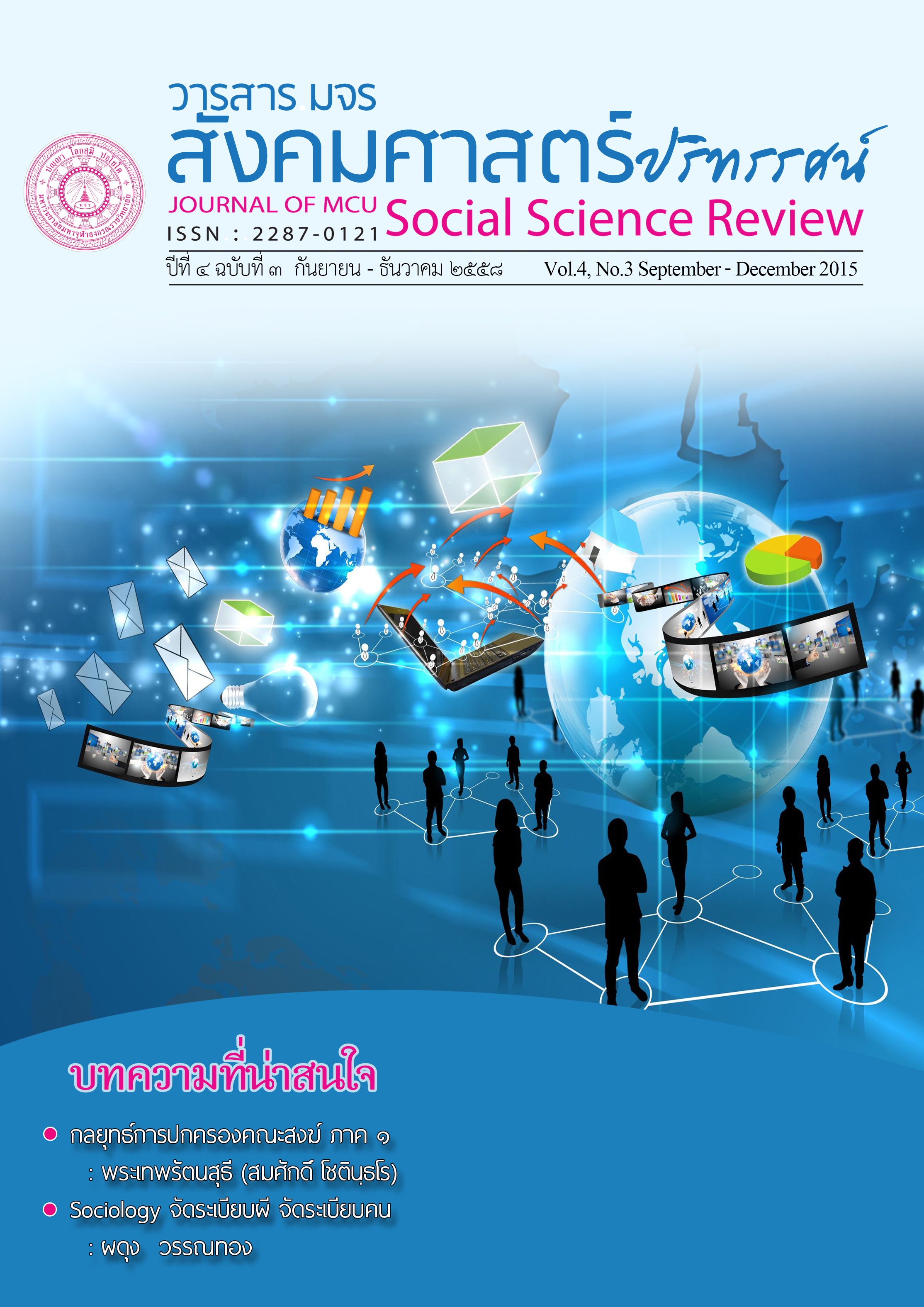การบริหารโครงการภาครัฐ : กรณีศึกษาโครงการพระสอนศีลธรรม ในโรงเรียน เขตกรุงเทพมหานคร
คำสำคัญ:
การบริหาร, โครงการภาครัฐ, โครงการพระสอนศีลธรรมบทคัดย่อ
การวิจัยครั้งนี้มีวัตถุประสงค์ คือ ๑) เพื่อศึกษาสภาพทั่วไปของโครงการพระสอนศีลธรรม ในโรงเรียน ๒) เพื่อศึกษาปัจจัยและหลักพุทธธรรมเกี่ยวกับการบริหารโครงการพระสอนศีลธรรมในโรงเรียน ๓) เพื่อเสนอแนวทางการส่งเสริมและพัฒนาโครงการพระสอนศีลธรรมในโรงเรียน ระเบียบวิธีวิจัยเป็นการวิจัยแบบผสานวิธี ระหว่างวิธีวิจัยเชิงคุณภาพและวิธีวิจัยเชิงปริมาณการวิจัยเชิงคุณภาพจากการสัมภาษณ์เชิงลึก รวมทั้งสิ้น ๒๙ รูป/คน ประกอบด้วย พระภิกษุสงฆ์/นักวิชาการ นักวิชาการ ผู้บริหารโครงการ ผู้บริหารสถานศึกษา การวิจัยเชิงปริมาณ สอบถามจากกลุ่มตัวอย่าง ได้แก่ ครูพระสอนศีลธรรมในโรงเรียน สังกัดมหาวิทยาลัยจุฬาลงกรณราชวิทยาลัย และมหาวิทยาลัยมหามกุฏราชวิทยาลัย จำนวน ๓๔๙ รูป และสถิติที่ใช้ในการวิเคราะห์ได้แก่ สถิติเชิงพรรณนา (Descriptive Statistics) ได้แก่ ความถี่ (Frequency) ร้อยละ (Percentages) ค่าเฉลี่ย () ส่วนเบี่ยงเบนมาตรฐาน (S.D.) และการวิเคราะห์แบบสัมภาษณ์เชิงลึก (In-depth Interview)
ผลการวิจัยพบว่า
๑.โครงการพระสอนศีลธรรมในโรงเรียน ได้รับงบประมาณอุดหนุนจากรัฐ เป็นโครงการต่อเนื่อง ดำเนินการโดยมหาวิทยาลัยมหาจุฬาลงกรณราชวิทยาลัยและมหาวิทยาลัยมหา มกุฏราชวิทยาลัย มีวัตถุประสงค์เพื่อจัดการเรียนการสอนวิชาการทางพระพุทธศาสนา ปลูกฝังคุณธรรมและจริยธรรมให้กับเยาวชน ตามนโยบายคุณธรรมนำความรู้ สู่สถานศึกษา โดยนำหลักพุทธธรรมมาประยุกต์ใช้ในการปรับเปลี่ยนพฤติกรรมให้เหมาะสม และสามารถแก้ปัญหาการเรียน และการดำเนินชีวิตได้ โดยมีหลักธรรมทางพระพุทธศาสนาเป็นเครื่องยึดเหนี่ยวทางจิตใจ และเพื่อให้พระสอนศีลธรรม ได้แลกเปลี่ยนเรียนรู้ร่วมกัน สามารถประยุกต์ใช้ในการจัดการสอน การติดตามผล การนำข้อมูลเสนอต่อผู้บริหาร
๒. ปัจจัยที่ส่งผลต่อการบริหารโครงการพระสอนศีลธรรม ปัจจัยที่ส่งผลต่อการบริหารโครงการที่ค่าเฉลี่ยสูงที่สุด ได้แก่ ปัจจัยด้านงบประมาณ ผู้บริหารมีความรู้เท่าทันต่อสถานการณ์ในการใช้งบประมาณ รองลงมาได้แก่ ปัจจัยด้านจริยธรรม ปัจจัยด้านบุคลากร (เจ้าหน้าที่/วิทยากร) ปัจจัยด้านการให้บริการประชาชน ปัจจัยด้านวัสดุอุปกรณ์ และปัจจัยที่มีค่าเฉลี่ยต่ำสุด คือ ปัจจัยด้านการบริหารงานทั่วไป และปัจจัยจากการสัมภาษณ์ ได้แก่ วิสัยทัศน์ของผู้บริหาร นโยบายรัฐบาล โรงเรียน ผู้ปกครอง และนักเรียน ตามลำดับ
๓. แนวทางการส่งเสริมและพัฒนาโครงการพระสอนศีลธรรมในโรงเรียน ส่งเสริมด้วยหลักสัปปุริสธรรม ให้ศีลธรรมคงอยู่กับความทันสมัยทางสังคม และเพื่อพัฒนาการบริหารให้เหมาะสมกับสถานการณ์ ผู้เรียน ตามรูปแบบที่เหมาะสม โดยความร่วมมือระหว่างรัฐบาลซึ่งออกนโยบาย สนับสนุนงบประมาณและสถาบันสงฆ์เป็นผู้ดำเนินการ ตามแนวทาง Model “6Mm” ดังนี้ ๑) Man = ปัจจัยด้านบุคลากร ต้องมีพันธกิจ (mission) ในการบริหารจัดการครูพระ มีกฎเกณฑ์ ระเบียบการคัดเลือก ทำสัญญา ขึ้นทะเบียนครูพระอย่างถูกต้อง และผ่านการอบรม ๒) Money = ปัจจัยด้านงบประมาณ มีการบริหารอย่างรู้เท่าทัน (modern knowledge) ในการบริหารโครงการ การวางแผนและควบคุม สื่อการสอน กิจกรรมในวันสำคัญทางศาสนา ตามงบประมาณที่ได้รับ ให้เกิดประโยชน์สูงสุดและมีประสิทธิภาพ ตามหลักจักขุมาและหลักวิธูโร ๓) Management = ปัจจัยด้านการบริหารงาน อย่างมีวิสัยทัศน์ที่ทันสมัย (modern vision) ในการบริหารโครงการ บริหารอย่างรู้เหตุ รู้ผล รู้โครงการ รู้การดำเนินงาน รู้งบประมาณ รู้บุคลากร รู้กาล ความเป็นอยู่ของสังคมในปัจจุบัน ก่อเกิดปัญญามองการณ์ไกล เป็นผู้มีวิสัยทัศน์กว้างไกล ๔) Material = ปัจจัยด้านวัสดุ มีความทันสมัย (modern technology) วัสดุ และสื่อการสอน การประชาสัมพันธ์ การประสานงานระหว่างโรงเรียน พระวิทยากร โครงการ มีการสื่อสารที่ทันสมัย ใช้อย่างรู้เท่าทันต่อสถานการณ์ ๕) Market = ปัจจัยด้านการให้บริการประชาชน โดยการให้ข้อมูลข่าวสาร (message) เช่น โรงเรียน สถานศึกษา ประชาชน หน่วยงานอื่น เกี่ยวกับโครงการ ผ่านเวปไซน์ และการสื่อสารอื่น ๖) Morality = ปัจจัยด้านจริยธรรม มีการบันทึก (memory) บันทึกคนดีธรรมดี ทั้งครูพระวิทยากร นักเรียน มีการประเมินพระวิทยากร ที่เป็นแบบอย่างในการสอน การร่วมกิจกรรมกับสถานศึกษา ผู้ปกครอง เป็นแบบอย่างที่ดี ควรยกย่อง โดยการชมเชยยกย่องให้เป็นแบบอย่าง
เอกสารอ้างอิง
๑. ภาษาไทย
(๑) หนังสือ
กาญจนา แก้วเทพ และคณะ. สื่อเพื่อชุมชน : การประมวลองค์ความรู้. กรุงเทพมหานคร: สำนักงานกองทุนสนับสนุนการวิจัย, ๒๕๔๓.
ธงชัย สันติวงษ์. การบริหารทรัพยากรมนุษย์. พิมพ์ครั้งที่ ๑๑. กรุงเทพมหานคร : บริษัทประชุมช่างจำกัด, ๒๕๔๖.
ประเวศ วะสี. พระพุทธศาสนากับจิตวิญญาณสังคมไทย. กรุงเทพมหานคร: มหาจุฬาลงกรณราชวิทยาลัย, ๒๕๓๙.
วิรัช วิรัชนิภาวรรณ. การวิจัยการจัดการทรัพยากรมนุษย์. พิมพ์ครั้งที่ ๑๙. กรุงเทพมหานคร: ฟอร์เฟซ, ๒๕๕๕.
สมเด็จพระมหารัชมังคลาจารย์. “การเผยแผ่พระพุทธศาสนา”. ในคู่มือพระสังฆาธิการว่าด้วยเรื่องการคณะสงฆ์และการพระศาสนา. กรุงเทพมหานคร: โรงพิมพ์การศาสนา, ๒๕๔๐.
(๒) วิทยานิพนธ์
บุญหนา จิมานัง และ ฤดี แสงเดือนฉาย. “การประเมินประสิทธิภาพการสอนของพระสอนศีลธรรมในสถานศึกษาเขตปกครองคณะสงฆ์ภาค ๙”. รายงานการวิจัย. มหาวิทยาลัยมหามหาจุฬาลงกรณราชวิทยาลัย, ๒๕๕๑.
ประจวบ ประเสริฐสังข์. “ปัจจัยที่มีผลต่อการปฏิบัติงานของพระธรรมจาริก : ศึกษาเฉพาะกรณี พระธรรมจาริก ที่ปฏิบัติงานในจังหวัดเชียงใหม่”. วิทยานิพนธ์สังคมสงเคราะห์ศาสตรมหาบัณฑิต. บัณฑิตวิทยาลัย: มหาวิทยาลัยธรรมศาสตร์, ๒๕๔๐.
(๓) เอกสารไม่ได้ตีพิมพ์
นพรัตน์ เบญจวัฒนานันท์. “เอกสารการประชุมมอบนโยบายและการปฏิบัติงานสำนักงานพระพุทธศาสนาแห่งชาติ โดยผู้อำนวยการสำนักงานพระพุทธศาสนาแห่งชาติ, วันที่ ๖ ตุลาคม ๒๕๕๓”.
ดาวน์โหลด
เผยแพร่แล้ว
รูปแบบการอ้างอิง
ฉบับ
ประเภทบทความ
สัญญาอนุญาต
ลิขสิทธิ์ (c) 2018 วารสาร มจร สังคมศาสตร์ปริทรรศน์

อนุญาตภายใต้เงื่อนไข Creative Commons Attribution-NonCommercial-NoDerivatives 4.0 International License.
เพื่อให้เป็นไปตามกฎหมายลิขสิทธิ์ ผู้นิพนธ์ทุกท่านต้องลงลายมือชื่อในแบบฟอร์มใบมอบลิขสิทธิ์บทความให้แก่วารสารฯ พร้อมกับบทความต้นฉบับที่ได้แก้ไขครั้งสุดท้าย นอกจากนี้ ผู้นิพนธ์ทุกท่านต้องยืนยันว่าบทความต้นฉบับที่ส่งมาตีพิมพ์นั้น ได้ส่งมาตีพิมพ์เฉพาะในวารสาร มจร สังคมศาสตร์ปริทรรศน์ เพียงแห่งเดียวเท่านั้น หากมีการใช้ภาพหรือตารางหรือเนื้อหาอื่นๆ ของผู้นิพนธ์อื่นที่ปรากฏในสิ่งตีพิมพ์อื่นมาแล้ว ผู้นิพนธ์ต้องขออนุญาตเจ้าของลิขสิทธิ์ก่อน พร้อมทั้งแสดงหนังสือที่ได้รับการยินยอมต่อบรรณาธิการ ก่อนที่บทความจะได้รับการตีพิมพ์ หากไม่เป็นไปตามข้อกำหนดเบื้องต้น ทางวารสารจะถอดบทความของท่านออกโดยไม่มีข้อยกเว้นใดๆ ทั้งสิ้น





